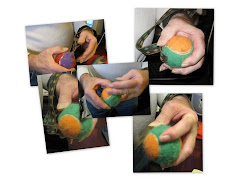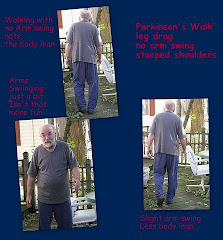For PD not all of the news is good but there is plenty of reason to hope

Beginning with the fun stuff. How good is it to hear that
Michael J Fox will be appearing again on the small screen, accessible to us all. Sometime in or after September 2010 an episode of
The Good Wife will air on CBS with Mr Fox as a guest star in the role of an attorney. You may not like the character he plays but we're looking forward to a performance to rival his outstanding work in Dennis Leary’s
Rescue Me on FX.
About
Cogane - not yet. The paper work for the Phase II Clinical Trials are being by prepared for submission to the FDA by Phytopharm. Phytopharm is a company which develops products from medicinal plants.
Clinical Trial NCT01060878 is not yet recruiting in New York.
 |
| How is the pipeline doing? |
There is no point in speculating on timeline to market because we’ve seen such nasty dates as 2013. Phytopharm is looking at two medications for Amyotrophic lateral sclerosis (ALS). One is Cogane and the other is a similar drug, Myogane, which already was awarded Orphan Medicinal Product designation by the European Agency for the Evaluation of Medicinal Products (EMEA) in 2008 following its orphan drug status by the FDA.
The financials for UCB look good this year with 63,500 patients in Europe alone using the Neupro Rotigotine transdermal patch. In the North America, Canadians and Mexicans can fill their Neupro prescriptions. This is not the case for those in the USA.
The Federal Food and Drug Administration
(FDA) has an interesting web site where you can check current drug shortages. The site lists the drug name and the manufacturer as well as the reason provided for the shortage. The last UCB Neupro update was on 5/05/2010. The information provided:
FDA has requested that UCB reformulate Neupro (rotigotine transdermal system) patches. UCB is committed to bringing Neupro to U.S. patients and has already made significant progress in the development of the new formulation.
In our search for the latest information about UCB and Neupro, we came across a document which is worth a read in the light of public animosity towards big pharma. It is a UCB corporate 2009 publication:
Patients, People, Planet, Ethics.
Addendum April 2012: The FDA finally approved the Neupro patch and UCB anticipates a return to the US market in July, 2012
 |
| Road Closed again? |
Stem Cell research has been dealt a blow by a splinter group and a Federal judge. The Obama Executive Order funding stem cell research has been hit with an injunction. You can read more of the recent story in
this blog article by PZ Myers which references the New Yorker article which many have read. The basis for the injunction is the destruction of the embryo for research and means that the federal guidelines would need to be rewritten for those researchers receiving federal funding. Private research is not affected. Federal monies can be used if another lab supplies the stem cells. The basis for the injuction is the
Dickey-Wicker amendment.
One of the best articles for explaining the injunction which grew from Sherley v. Sebelius can be found in the
Jolt Digest of the Harvard Journal of Law and Technology.
For those PwPs concerned about a
shortage of Sinemet (levodopa-carbidopa) we refer you to a public letter written to Amy Comstock Rick CEO of the
Parkinson’s Action Network (PAN) by Michael Rosenblatt, M.D. Executive Vice President and Chief Medical Officer of
Merck and Co, Inc. In the letter Dr Rosenblatt explains that the shortage arose as a result of changing the supplier of the active ingredient. The shortage was not due to a product defect. Generic substitutes which may not contain the exact proportion of the components but which are also safe and effective are also available.
September 2, 2010 addendum
You can
read the 8/31/10 Motion to Stay filed by the Secretary of the Dept of Health and Human Services.
You can
add your voice for support through Parkinson's Action Network and letters to your elected officials in Washington, DC. Just click on
Take Action
September 9, 2010 addendum
Per an item from PAN: "...within the last hour the DC Court of Appeals issued a
stay of the preliminary injunction halting federal funding for human embryonic stem cell research. It would appear that the stay is only in place while the full arguments about the request for a stay of the preliminary injunction are heard in the Court of Appeals, but the important aspect is that, for at least the time period that it takes for this next phase of the case, the injunction is no longer in place against National Institutes of Health (NIH) and funding can continue."
You can read a few more details at the
NPR website
At the PAN website you will also see a link to
VA information:
VA Publishes Final Regulation to Aid Vietnam Veterans Exposed to Agent Orange
On August 31, 2010, The Department of Veterans Affairs (VA
) published its final regulation establishing Parkinson’s disease, ischemic heart condition, and B-cell leukemias as service-connected disabilities for Vietnam veterans exposed to Agent Orange. The final regulation grants a 100% disability rating for Parkinson's disease, as well as retroactive veteran and survivor payments for qualifying veterans. There will still be a 60 day review period by Congress before payments go into effect.
On the fun side, the
American Parkinson Disease Association (APDA) recently published the
Walk-A-Thon schedule for September and October 2010. Just scroll down the page to see 3 upcoming events.
Although the
Parkinson’s Disease Foundation has not announced its next Expert Briefing or on-line educational events schedule, you can still
access past seminars. The information remains both timely and helpful covering a broad range of information.
For many people with Parkinson’s, when the “off” times become too symptomatic, there is little choice but to add a COMT inhibitor to the levodopa-carbidopa mix.
Stalevo is the medication of many who need to add entacapone to their l-dopa-carbidopa regimen in order to control the dyskinesia - dystonia which occurs. The FDA has now announced a safety review of a
possible cardiac risk from use of Stalevo.
 |
| A bit off balance? |
At Steve’s last neurology appointment he tried to discuss
orthostatic hypotension (OH) with the doctor. The doctor was in agreement that the symptom could be PD related, medication related or a symptom exacerbated by medication(s). I think that he is waiting for us to propose something. We’ve mentioned Northera (TM)
droxidopa before. I thought it was interesting to learn that
Chelsea Therapeutics International, Ltd is now considering droxidopa for Chronic Fatigue Syndrome (CFS) as well as
neurogenic orthostatic hypotension (NOH).
Droxidopa is a synthetic precursor to norepinephrine. Dopamine is also a precursor and it is thought that the serious symptoms of PD do not appear until norepinephrine neurons begin to decline in numbers. Currently in two
phase III clinical trials for NOH in a number of conditions with primary autonomic failure as well as fibromyalgia and ADD for which it is in phase II trials.
If you are considering a Droxidopa Clinical Trial, there are
several locations from which to choose.
Recently there was an announcement that a study by the NeuroGenetics Research Consortium has found a there is a
link between immune system gene variants and Parkinson’s disease. This particular study led by
Haydeh Payami has been active for at least 20 years. Based upon the study results closer scrutiny will be given to “the possible role of infection, inflammation and autoimmunity in Parkinson's disease.” Other Parkinson’s specialists have long proposed the possibility of PD as a disease on inflammation.
Then there is the news about the search and discovery of
LRRK2 blockers for patients with mutations of that overactive protein which appears to cause neuron death and consequently PD. Two medications were found which appear to block
LRRK2 and to prevent neurotransmitter death in lab rodents. Hence is a new target for treatment development.
 On a personal note
On a personal note: Steve has been trying another herbal supplement. Huperzine A is a low level acetylcholinesterase inhibitor for improved cognitive function. It has been a few weeks and we have not seen any negative side effects although we have seen some positive effects, so we plan to order another bottle from Swanson.
We do realize that this is really an Alzheimer's disease (AD) supplement rather than a PD supplement so we are watching carefully and will probably stop for a few weeks to observe changes.
If you are interested in
Clinical Trials with open recruiting for Parkinson's Disease, check the NIH listings. You can select MAP in order to find trials in your area.
At this
Clinical Trials.gov page you will see
a wide variety of PD specific trials now recruiting in such area as Transdermal nicotine patches, Transcranial Magnetic Stimulation (TMS), Overactive bladder, Urate elevation, antidepressants, Rivastigamine Patch, Rasagiline (Azolect) as an add-on to dopamine agonists, effect of exercise, Safinamide, Non9nvasive Brain stimulation, Memantine for gait and attention deficits, Ropinerole (open label), facial expression, efficacy of voice treatment, CoQ10 (there is also one for Huntington'sdisease), SAM-e, biomarkers, Naltrexone for impulse control disorders, Isradipine (Dynacirc), green tea (polyphenols), Vitamin B12, Apathy, Swallowing Training. In all there are 274 open trials although not all are recruiting yet.
One last note: the PD-chocolate trial is only being conducted in Germany at Dresden University of Technology. On a personal note, some of us are waiting for the caregiver trials involving fine chocolates.
 Beginning with the fun stuff. How good is it to hear that Michael J Fox will be appearing again on the small screen, accessible to us all. Sometime in or after September 2010 an episode of The Good Wife will air on CBS with Mr Fox as a guest star in the role of an attorney. You may not like the character he plays but we're looking forward to a performance to rival his outstanding work in Dennis Leary’s Rescue Me on FX.
Beginning with the fun stuff. How good is it to hear that Michael J Fox will be appearing again on the small screen, accessible to us all. Sometime in or after September 2010 an episode of The Good Wife will air on CBS with Mr Fox as a guest star in the role of an attorney. You may not like the character he plays but we're looking forward to a performance to rival his outstanding work in Dennis Leary’s Rescue Me on FX.


 On a personal note: Steve has been trying another herbal supplement. Huperzine A is a low level acetylcholinesterase inhibitor for improved cognitive function. It has been a few weeks and we have not seen any negative side effects although we have seen some positive effects, so we plan to order another bottle from Swanson.
On a personal note: Steve has been trying another herbal supplement. Huperzine A is a low level acetylcholinesterase inhibitor for improved cognitive function. It has been a few weeks and we have not seen any negative side effects although we have seen some positive effects, so we plan to order another bottle from Swanson.














Going gluten free got rid of my restless legs syndrome.
ReplyDeleteFYI. Cogane trial IS recruiting now for Phase II
ReplyDeleteUnited States, New York
North Shore University Hospital Recruiting
Manhasset, New York, United States, 11030
Contact: Study Coordinator 516-562-2410
A grateful Thank you to Viktor Tron for the update
ReplyDeleteCheck Clinical Trials - Cogane Ohase II in the right column for a link to the other participating locations at the Clinical Trials.gov web site